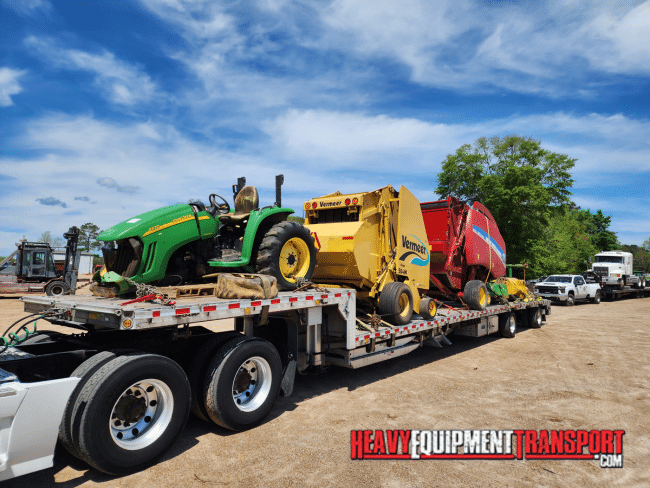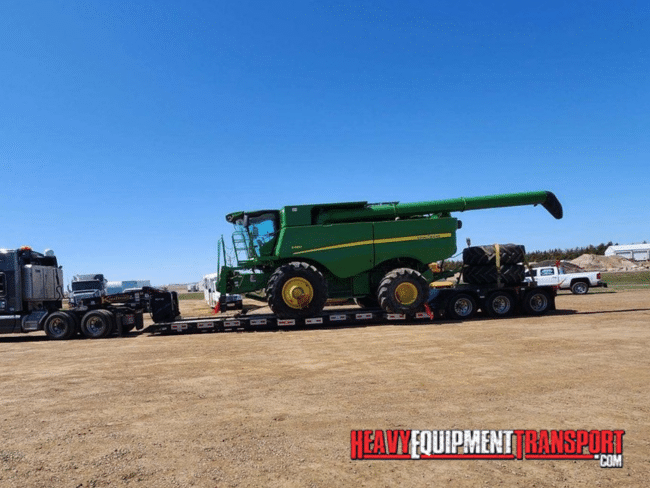The Most Common Reasons Equipment Transport Gets Delayed

Francisca Olive / June 2023
Delays are not uncommon and often occur without prior warning. Your organization has to work with a carrier with extensive expertise in preventing, navigating, and avoiding delays for its customers, as there are many potential causes. Read on to learn some of the common reasons for equipment delivery delays.
Reason 1: Issues with Documentation
A lack of proper documents is a common reason for equipment transport delays. Shipping freight involves documents such as a bill of lading, commercial invoice, certificate of origin, and any applicable special certificates. If documents are missing, an extra customs check will need to be performed, which will cause a delivery delay.
Clearance times are lengthened, and shipments are often refused entry due to mistakes in details like the country of origin, HS code, and product specifications.
Your paperwork will be thoroughly examined from the initial port of call to loading, unloading, transfers, and customs. If your handwriting is legible, you can speed up the delivery of your items. Illegible or poorly printed documents might slow down the customs clearance process.
Important details about your shipment should be included on the shipping label. Labeling your shipment incorrectly might cause problems at the customs office or cause it to be lost in transit.

Reason 2: Peak Season
Freight shipping volumes tend to increase during peak shipping seasons. The supply chain might get overwhelmed when the demand is high, delaying your freight. This is a classic case of high demand and insufficient supply, stressing the supply chain and logistics system.
Seasonal demand spikes are a common cause of delays. It may also cause shipping rates to increase or a peak season fee to be implemented. Many exporters and importers split their items up into smaller shipments and ship them out ahead of time to minimize delays during peak shipping seasons.
Reason 3: Lack of Visibility
Your freight or delivery partner must understand exactly what you need from them before committing to a partnership. An essential aspect of any successful business relationship is communicating clearly and openly with each other. For your partner to meet your expectations, they must be aware of those standards from the beginning.
Inefficiencies arise when there is a lack of transparency, which can lead to a halt in the supply chain and an increase in the likelihood of missing, damaged, or delayed packages. Transparency is essential throughout the journey; this may be provided by a carrier with state-of-the-art tracking equipment and open and honest communication from the get-go.
Transport Your Equipment Today
Heavy Equipment Transport is always available for a quote. Fill out the form or give us a call now! (888) 730-2951
Reason 4: Road Conditions
This is another common reason for equipment transport delays. To a large extent, delivery times are impacted by traffic. Vehicles may be delayed due to unforeseen circumstances such as accidents, road construction, bad weather, road debris, or heavy traffic during peak travel times. A route optimization tool can help transportation companies plan their routes more efficiently in light of variable traffic conditions.
Reason 5: Port Congestion
The ports in the United States have experienced extreme congestion due to a lack of labor, storage space, and handling equipment. The Oakland port had a 7-day average stay time in the first quarter of 2022, making it one of the most congested ports in the world. Following closely behind in terms of traffic jams and ship delays are other large ports such as Charleston, Los Angeles, and Long Beach.
Buffering your shipping schedule and choosing less congested ports are two ways to mitigate this risk.

Reason 6: Ineffective Planning
Older shipment planning software only considers a narrow set of variables inside the shipping process rather than the larger risks that might influence the business and its clients. These methods of preparation leave delivery open to disruption due to unforeseen circumstances.
To perform a real-time supply chain risk analysis, use a transportation planning system that unifies supply chain planning with shipping execution.
Reason 7: Weather Conditions
The Federal Highway Administration (FHWA) estimates that trucking businesses lose up to $3.5 billion yearly due to weather-related delays on the road. These delays account for 23% of all traffic delays.
When it rains, freezes, blows, or snows, traffic moves more slowly, and more accidents occur. Vehicles, ships, trains, and planes are all affected by extreme weather, such as strong thunderstorms. Extreme weather events are difficult to manage logistically since they are brief, sporadic, and localized.
Reason 8: Vehicle Issues
This is a common reason for equipment transport delays. Vehicle breakdowns are a fact of life that can’t be avoided. With web-based monitoring or constant updates, a company can identify which driver is closest to a broken-down vehicle and provide help in minutes. That way, equipment delivery delays will be minimal and won’t hurt the company too much.
Key Takeaway
While it may be impossible to avoid shipment delays, learning to anticipate and prepare for potential bottlenecks may help minimize disruptions. Keeping an eye out for the problems above can help you prevent inconvenient holdups.

William Thomas
Heavy Transport Specialist
Being able to lead a team of such talented logistics agents has been a wonderful experience over the past ten years. If you would like to know anything more about the heavy equipment transport services we offer, don't hesitate to give us a call!